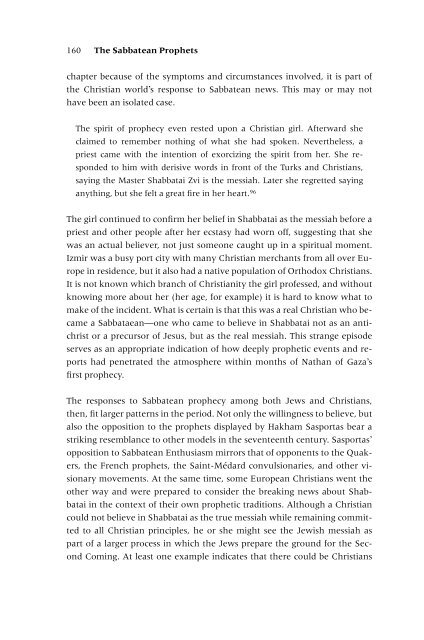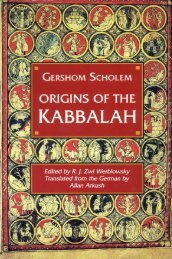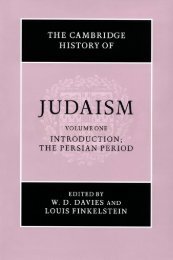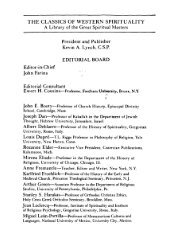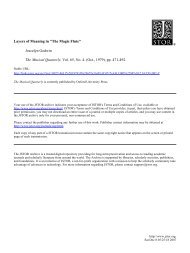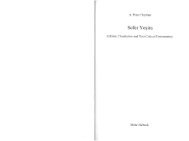You also want an ePaper? Increase the reach of your titles
YUMPU automatically turns print PDFs into web optimized ePapers that Google loves.
160 <strong>The</strong> <strong>Sabbatean</strong> <strong>Prophets</strong><br />
chapter because of the symptoms and circumstances involved, it is part of<br />
the Christian world’s response to <strong>Sabbatean</strong> news. This may or may not<br />
have been an isolated case.<br />
<strong>The</strong> spirit of prophecy even rested upon a Christian girl. Afterward she<br />
claimed to remember nothing of what she had spoken. Nevertheless, a<br />
priest came with the intention of exorcizing the spirit from her. She responded<br />
to him with derisive words in front of the Turks and Christians,<br />
saying the Master Shabbatai Zvi is the messiah. Later she regretted saying<br />
anything, but she felt a great fire in her heart. 96<br />
<strong>The</strong> girl continued to confirm her belief in Shabbatai as the messiah before a<br />
priest and other people after her ecstasy had worn off, suggesting that she<br />
was an actual believer, not just someone caught up in a spiritual moment.<br />
Izmir was a busy port city with many Christian merchants from all over Europe<br />
in residence, but it also had a native population of Orthodox Christians.<br />
It is not known which branch of Christianity the girl professed, and without<br />
knowing more about her (her age, for example) it is hard to know what to<br />
make of the incident. What is certain is that this was a real Christian who became<br />
a Sabbataean—one who came to believe in Shabbatai not as an antichrist<br />
or a precursor of Jesus, but as the real messiah. This strange episode<br />
serves as an appropriate indication of how deeply prophetic events and reports<br />
had penetrated the atmosphere within months of Nathan of Gaza’s<br />
first prophecy.<br />
<strong>The</strong> responses to <strong>Sabbatean</strong> prophecy among both Jews and Christians,<br />
then, fit larger patterns in the period. Not only the willingness to believe, but<br />
also the opposition to the prophets displayed by Hakham Sasportas bear a<br />
striking resemblance to other models in the seventeenth century. Sasportas’<br />
opposition to <strong>Sabbatean</strong> Enthusiasm mirrors that of opponents to the Quakers,<br />
the French prophets, the Saint-Médard convulsionaries, and other visionary<br />
movements. At the same time, some European Christians went the<br />
other way and were prepared to consider the breaking news about Shabbatai<br />
in the context of their own prophetic traditions. Although a Christian<br />
could not believe in Shabbatai as the true messiah while remaining committed<br />
to all Christian principles, he or she might see the Jewish messiah as<br />
part of a larger process in which the Jews prepare the ground for the Second<br />
Coming. At least one example indicates that there could be Christians


